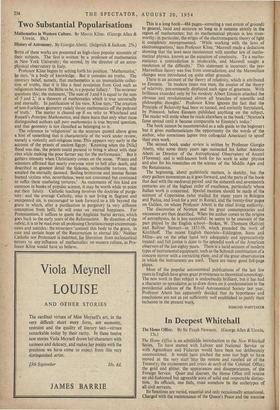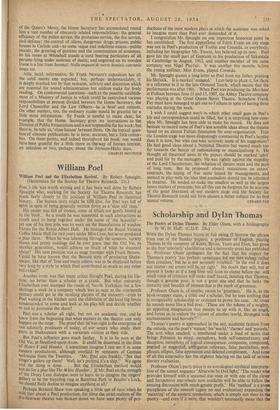In Deepest Whitehall
The Home Office is an admirable introduction to the New Whitehall Series. To have started with Labour and National Service or with Agriculture and Fisheries would have been too deliberately unsensational. It would have pitched the note too high to have moved at the very start into the remote and rarefied air of the Treasury; the excitements and crises de nerfs of the Colohial Office; the gold and glitter, the appearances and disappearances, of the Foreign Service. Quiet and discreet, the Home Office still retains an old-fashioned but agreeable aura of solid and respectable distinc- tion. Its officials, one feels, must somehow be the archetypes of all civil servants.
Its ftmctions are varied, essential and only occasionally sensational. Charged with the maintenance of the Queen's Peace and the exercise of the Queen's Mercy, the Home Secretary has accumulated round him a vast number of obscurely related responsibilities: the general efficiency of the police service, the probation service, the fire service, civil defence; the control of aliens, dangerous drugs, prisons, public houses in Carlisle and—to some vague and indefinite extent—public morals; the granting of pardons and the commutation of sentences. In his room at Whitehall stands a card bearing particulars of all persons lying under sentence of death; and engraved on its wooden frame is a line from Juvenal: Nulla unquam de morte hominis cunctatio longa est.
Able, lucid, informative, Sir Frank Newsam's exposition has all the solid merits one expected; but, perhaps understandably, it is deeply marked. too by that restraint, sobriety and discretion which are essential for sound administration but seldom make for lively reading. On controversial questions—such as the possible establish- ment of a Ministry of Justice in which could be centralised various responsibilities at present divided between the Home Secretary, the Lord Chancellor and the Law Officers—he is brief and reticent. On other matters, too, the ordinary reader would be grateful for a little more information. Sir Frank is careful to make clear, for example, that the Home Secretary gives no instructions to the Director of Public Prosecutions and is not responsible for his work; but there is, he tells us, 'close liaison' between them. On the topical ques- tion of obscene publications he is terse, accurate, but a little colour- less. On these points, and indeed throughout his book, one would have been grateful for a little more in theway of human interest; an anecdote or two, perhaps, about the Joynson-Hicks days.
CHARLES MONTEITH



































 Previous page
Previous page